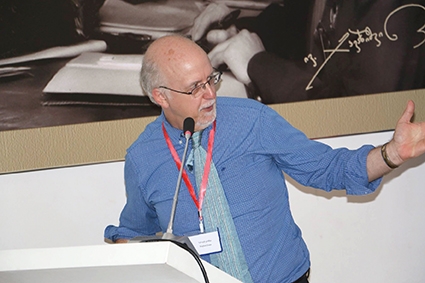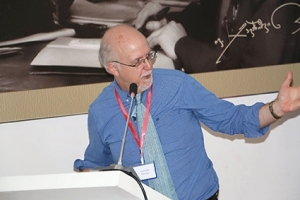The First Republic: (Un)Deservedly (Un)Revered?
Exclusive Interview
What is the legacy of the First Republic of Georgia? The country celebrated 100 years of independence last month, but is it as cherished as it deserves? What lessons can be learnt from those three years of independence that were ultimately cut short by the Russian Bolsheviks? These were the questions we asked Prof. Stephen Jones, one of the foremost international experts on Post-soviet societies and an avid scholar of Georgia’s First Republic. The esteemed Professor, alongside other well-established names, was giving a public lecture at a conference dedicated to the legacy of the First Republic at the Tbilisi State University when GEORGIA TODAY met him to pick his brains on this very topic.
At one of your lectures in Brussels you said that the First Republic hasn’t received as much recognition as it deserved in Georgia, that it was not a popular subject to research until very lately. Why do you think this is?
I think that the First Republic is very historically significant, not only for Georgia but for European history because it really was the first social democratic republic in Europe and it was influential that many top politicians in Europe came to Georgia in 1920 to find out more about it and what it was doing; so I think the significance of the Republic is important and is worth remembering, yet until perhaps a year ago, nobody was talking about it; in some sense it took the 100th anniversary to bring it back to our minds. Why? Because it was a social democratic republic, it was associated with socialism and also with the Soviet Union, and anything to do with socialism or that period was seen as bad. After the independence of Georgia in 1991, nobody was really interested in exploring the First Republic because of the memory of Soviet socialism.
Was it perhaps because of the perception that they lacked national vision and were much more reliant on socialism?
I would completely reject that idea. I think that Georgia of course had socialist ideas, but this was a very popular ideology at the time in the rest of the Russian Empire; everybody was almost anti Tsarist and the solution they sought was socialism, but it wasn't just socialism, it was also national liberation, particularly for non-Russians, and Georgia developed its own very distinct ideas about what socialism would look like in Georgia; it was socialism in Georgian colors because it had a very distinct national form. The Georgian Social Democrats were internationalists at some level but they believed at the time they came to power in 1918, when they had to build the state and had to consolidate a nation, that internationalism was built on the idea of every nation having the right to self-determination, built on the idea of a society, of an international society of nations, not of a proletariat - they had moved beyond that by 1918.
We cannot talk about the First Republic without mentioning Noe Zhordania, Chairman of the First Republic. Do you think one of the reasons for this lack of popularity of the First Republic would be the very open and public row that Zhordania had with Ilia Chavchavadze, widely recognized as the father of the nation?
Ilia Chavchavadze is considered a saint for Georgians, seen as the father of the nation; so by definition, anybody who opposed him appeared unpatriotic. Noe Zhordania and others in the social democratic organization developed, changing based on what they were reading, what they were listening to, what international developments were happening, and they became more nationalist. Zhordania was very interesting as a theoretician in terms of his understanding of the relationship between the nation and socialism, he had an understanding of the nation as something that was an economic unit and had to develop economically but knew also that it was a cultural unit. For Chavchavadze, it was much more about culture, about history, about language. One other thing to remember is that once you move from opposition (Jordania was in the opposition until 1917) to the ruling party, then your attitude is bound to change because now you have a much greater responsibility, you are protecting not only the working class, you are protecting your citizens and this is a different concept and I think Zhordania recognized very quickly that this was no longer about defending a particular class: this was now about defending the nation and the state that represented the nation.
What about the decision not to fight the Soviet Occupation forces? Was there ever a chance of success?
It would have been a very bloody defense of Tbilisi if they’d tried. The Georgian armed forces at that time were not very strong; the economy was very bad, there was very serious inflation and problems of supplies affecting not just Georgian civilians but the army too. There were maybe 20,000 soldiers ready to fight, not enough to defend themselves against the Red Army which was much more powerful and of course much more numerous. If they had fought, they would have been overwhelmed by the Red Army. That doesn't mean they shouldn't have, maybe they should have, but I don't think the outcome would have been a successful defense of the state.
Do you think the decision not to fight tarnished the legacy of the First Republic somewhat in the eyes of Georgians?
Yes. When I talk to Georgians, very often this is the first thing they will say: that Georgian Social Democrats betrayed Georgia because they left without a fight; you know this is certainly a criticism.
One of the more vivid parallels that connect the old and new Georgian republics is the enduring problem of dealing with ethnic minorities. Is it us not learning or external influence?
I think the answer to that is both. Russia still has its imperial ambitions in the border areas but Georgians could choose to increase the security of the state by integrating national minorities more effectively. One of the reasons Russia was successful with [breakaway] Abkhazia and South Ossetia is because Abkhazians and South Ossetians did not think they were part of the Georgian state; they didn't think that the Georgian nation accepted them as equals. In many cases, it's the responsibility of the larger group to assure the smaller group that they are equal and that they will have equal rights even if the concerns of the smaller group are exaggerated or even unreal; they have to be reassured and they have to be given perhaps some special treatment, at least temporarily, so that they have this sense they are part of the nation. The is no one way to effectively deal with national minority problems. If Georgia wants national security, then it has to integrate national minorities more effectively and assure them that they are equal partners in the nation.
Any international examples you’d recommend Georgians look at?
There are many ways to do that. For example, Northern Ireland. After centuries of bloodshed, Northern Ireland is now essentially a non-violent place. The issue was solved by an agreement between Ireland, Northern Ireland and England, solved through shared sovereignty, where Northern Ireland was seen in some ways as part of Ireland as well as part of the United Kingdom; so there are always imaginative solutions to how to integrate minorities into your country.
I'm just giving you an example of a particular type of solution; in the Russian case this would not be possible because Russia would not accept it and I think right now it's too late in some sense because the Abkhazians and South Osssetians now are so hostile to Georgians that no matter what Georgia does, and Georgia is always trying to offer some solutions, they won't accept it because the role of Russia is so powerful.
By Vazha Tavberidze












